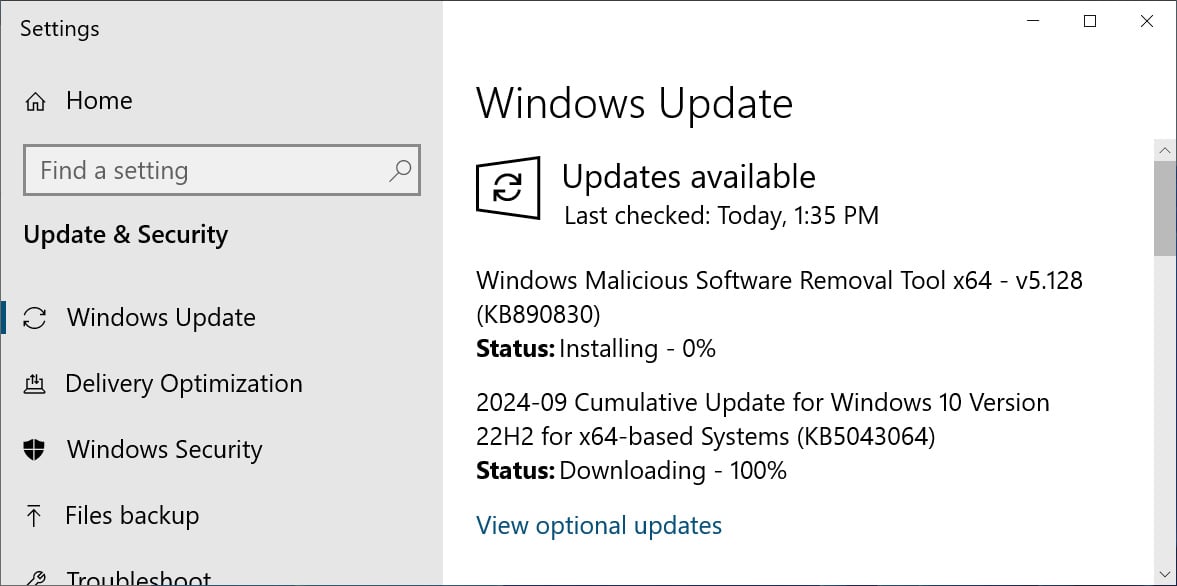Microsoft has released the KB5043064 cumulative update for Windows 10 22H2 and Windows 10 21H2, which includes 6 changes and fixes, including a fix for Bluetooth devices that stop working due to a memory leak.
The Windows 10 KB5043064 update is mandatory as it contains Microsoft’s September 2024 Patch Tuesday security updates, which fix 142 vulnerabilities.
Windows users can install this update by going into Settings, clicking on Windows Update, and manually performing a ‘Check for Updates.’
However, as this update is mandatory, it will automatically start installing in Windows once you check for updates. To make this more manageable, you can schedule a time when your computer is restarted to finish the installation.

Source: BleepingComputer
After installing this update, Windows 10 22H2 will be updated to build 19045.4894.
Windows 10 users can also manually download and install the KB5043064 update from the Microsoft Update Catalog.
What’s new in Windows 10 KB5043064
The KB5043064 update includes numerous Windows fixes, including a bug that caused the operating system to boot into the BitLocker recovery screen.
This update also includes a total of fourteen fixes, with the highlighted ones listed below:
-
[Windows Installer] When it repairs an application, the User Account Control (UAC) does not prompt for your credentials. After you install this update, the UAC will prompt for them. Because of this, you must update your automation scripts. Application owners must add the Shield icon. It indicates that the process requires full administrator access. To turn off the UAC prompt, set the HKEY_LOCAL_MACHINESOFTWAREPoliciesMicrosoftWindowsInstallerDisableLUAInRepair registry value to 1. The changes in this update might affect automatic Windows Installer repairs; see Application Resiliency: Unlock the Hidden Features of Windows Installer.
-
[Input Method Editor (IME)] When a combo box has input focus, a memory leak might occur when you close that window.
-
[Country and Operator Settings Asset] This update brings COSA profiles up to date for certain mobile operators.
-
[Bluetooth] An app stops responding because of a memory leak in a device.
-
[Bind Filter Driver] Your system might stop responding when it accesses symbolic links.
-
[Unified Write Filter (UWF) and Microsoft System Center Configuration Manager (SCCM)] An SCCM task to re-enable UWF fails because of a deadlock in UWF. This stops the device from restarting when you expect it.
Unfortunately, one long-standing issue still impacts Windows 10, causing users to receive 0x80070520 errors when attempting to change their account profile pictures.
Microsoft is also aware of an issue impacting devices dual-booting Windows and Linux that causes Linux not to boot.
As part of the August 2024 Patch Tuesday, Microsoft released a security update that applied a Secure Boot Advanced Targeting (SBAT) setting to devices that run Windows to block boot managers with known vulnerabilities that could be used to bypass security boot.
Unfortunately, this caused devices dual-booting Linux on older bootloaders to no longer boot properly, receiving a “Verifying shim SBAT data failed: Security Policy Violation. Something has gone seriously wrong: SBAT self-check failed: Security Policy Violation.” error.
Microsoft shared a temporary fix, which entails removing the SBAT update from Windows 10.
A full list of fixes can be found in the KB5043064 support bulletin and last month’s KB5041582 preview update bulletin.
